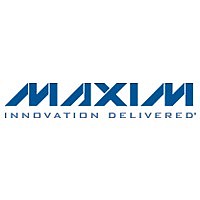78M6613-IMR/F Maxim Integrated Products, 78M6613-IMR/F Datasheet - Page 19

78M6613-IMR/F
Manufacturer Part Number
78M6613-IMR/F
Description
IC AC PWR MON APPLIANCES 32-QFN
Manufacturer
Maxim Integrated Products
Datasheet
1.78M6613-IMF.pdf
(33 pages)
Specifications of 78M6613-IMR/F
Lead Free Status / RoHS Status
Lead free / RoHS Compliant
DS_6613_018
78M6613 Data Sheet
3.8 Crystal Oscillator
The oscillator of the 78M6613 drives a standard 32.768 kHz watch crystal. The oscillator has been
designed specifically to handle these crystals and is compatible with their high impedance and limited
power handling capability. Good layouts will have XIN and XOUT shielded from each other.
Since the oscillator is self-biasing, an external resistor must not be connected across the crystal.
3.9 Flash Programming
Operational or test code can be programmed into the Flash memory using either an in-circuit emulator or
the Flash Programmer Module (TFP-2) available from Teridian. The Flash programming procedure uses
the E_RST, E_RXTX, and E_TCLK pins.
3.10 MPU Firmware Library
Any application-specific MPU functions mentioned above are available from Teridian as a standard
ANSI C library and as ANSI “C” source code. The code is pre-programmed in Demonstration and
Evaluation Kits for the 78M6613 IC and can be pre-programmed into engineering IC samples for system
evaluation. The application code allows for quick and efficient evaluation of the IC without having to
write firmware or having to purchase an in-circuit emulator (ICE). A Software Licensing Agreement
(SLA) can be signed to receive either the source Flash HEX file for use in a production environment or
(partial) source code and SDK documentation for modification.
3.11 Measurement Calibration
Once the 78M6613 Power and Energy Measurement device has been installed in a measurement
system, it is typically calibrated for tolerances of the current sensors, voltage dividers and signal
conditioning components. The device can be calibrated using a single gain and a single phase
adjustment factors accessible to the CE. The gain adjustment is used to compensate for tolerances of
components used for signal conditioning, especially the resistive components. Phase adjustment is
provided to compensate for phase shifts introduced by certain types of current sensors.
Due to the flexibility of the MPU firmware, any calibration method, such as calibration based on energy,
or current and voltage can be implemented. It is also possible to implement segment-wise calibration
(depending on current range). Teridian software supports a “quick cal” method.
Rev. 1.1
19












